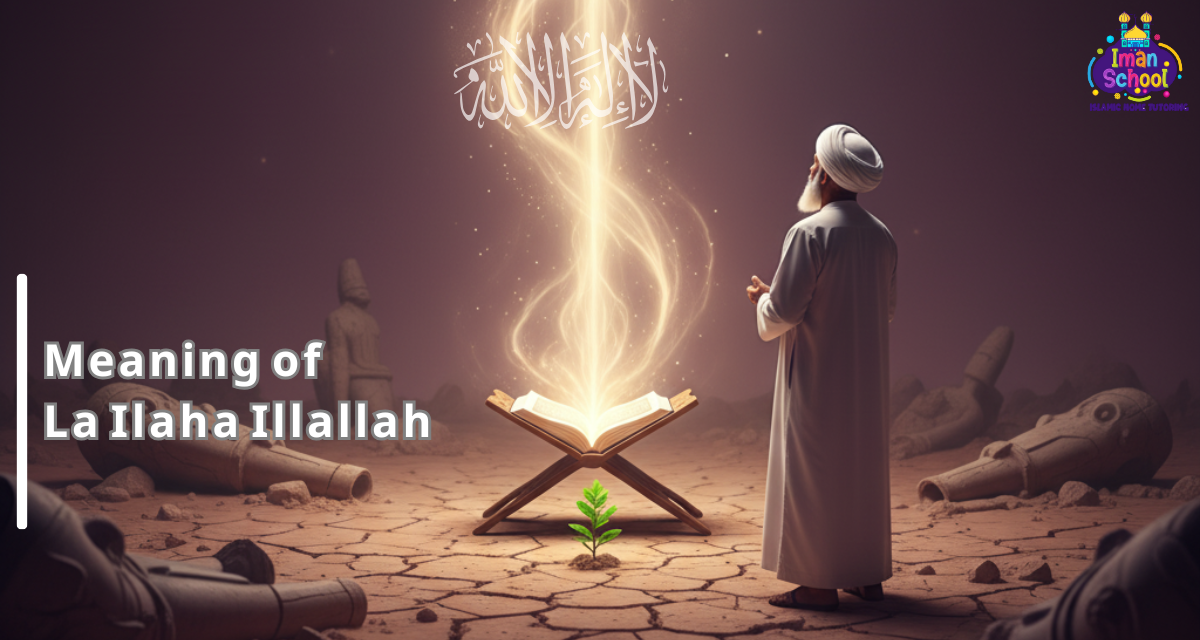The meaning of La Ilaha Illallah stands as the single most profound statement in Islam. It is the declaration that separates belief from disbelief, defining the entire faith. For those exploring what is the core belief of Islam, understanding the meaning of La Ilaha Illallah is the starting point. It is not merely a religious slogan; it is the comprehensive foundation of the Islamic worldview, the Kalimat at-Tawhid (The Word of Monotheism).
La Ilaha Illallah Translation: The Literal Meaning
The literal La Ilaha Illallah translation is: “There is no deity worthy of worship except Allah.”
The meaning of La Ilaha Illallah is often simplified to "There is no god but God," but this misses the deep theological weight of the word Ilah. Ilah means not just "god," but anything that is worshipped, relied upon, or devoted to. The meaning of La Ilaha Illallah is thus a radical declaration that every form of adoration, allegiance, and devotion must be directed only to the One, True Creator.

The Two Pillars of La Ilaha Illallah: Negation and Affirmation
The immense power of the meaning of La Ilaha Illallah lies in its two fundamental theological components, known as the pillars of La Ilaha Illallah:
-
Negation (La Ilaha - There is no deity): This pillar negates the divinity and right to worship of all creation—idols, false gods, desires, wealth, or power. It requires a complete rejection of the definition of Shirk (polytheism). This is the absolute denial of any partners for Allah in His worship.
-
Affirmation (Illallah - Except Allah): This pillar affirms that the only being worthy of all forms of worship, submission, and devotion is Allah alone. This affirmation establishes the purest form of Tawhid in Islam, which is the total oneness and uniqueness of God.
The phrase is structured to wipe out all false notions of divinity before establishing the truth.
The Spiritual Impact of La Ilaha Illallah on a Muslim's Life
The meaning of La Ilaha Illallah is not just an utterance; it is a spiritual charter that dictates a Muslim’s entire life. It is what is the greatest phrase in Islam because it grants the believer true liberation. By affirming the meaning of La Ilaha Illallah, a person breaks free from servitude to creation, fear of men, and reliance on material things.
The La Ilaha Illallah benefits include:
-
Inner Peace: Knowing that all power and destiny rest with Allah brings tranquility.
-
Clarity of Purpose: Life's goal becomes singular: worshipping Allah alone.
-
Courage: The believer fears no one but the Creator.
This declaration forms the basis of the Islamic creed for beginners and clarifies why La Ilaha Illallah is important for every aspect of a Muslim’s existence.
The Conditions of La Ilaha Illallah: How to Live by It
Scholars emphasize that the utterance of the meaning of La Ilaha Illallah must be accompanied by certain conditions of La Ilaha Illallah to be fully accepted by Allah. Simply saying the words is insufficient; they must be implemented in heart and action. These conditions clarify the meaning of the testimony of faith.
-
Knowledge (Al-’Ilm): To know the true meaning of La Ilaha Illallah and what it negates and affirms. (Surat Muhammad 47:19: "So know that there is no god but Allah...")
-
Certainty (Al-Yaqin): To believe in it with absolute certainty, free from any doubt.
-
Acceptance (Al-Qabul): To accept all the requirements of the phrase, not rejecting any part of the truth it conveys.
-
Submission (Al-Inqiyad): To submit and act upon it by performing the duties commanded by Allah.
-
Truthfulness (As-Sidq): To say it sincerely and truthfully from the heart.
-
Sincerity (Al-Ikhlas): To declare it purely for the sake of Allah, free from definition of Shirk.
-
Love (Al-Mahabbah): To love the phrase, what it stands for, and those who act upon it.
Meaning of La Ilaha Illallah: Why It is the Key to Paradise
The meaning of La Ilaha Illallah makes it the first pillar of Islam and the key to eternal salvation. The La Ilaha Illallah Hadith from the Prophet Muhammad (peace be upon him) states:
"The person who dies while knowing that there is no god but Allah will enter Paradise." (Reported by Muslim)
This illustrates the transformative power of this statement. It is the cornerstone of understanding monotheism in Islam and the essence of the path to Paradise. Knowing and acting upon the meaning of La Ilaha Illallah is the greatest possible act of faith a person can undertake.
Recommended Reads
- Battle of Badr
- Khadija bint Khuwaylid
- Quran and Sunnah Relationship
- Islamic Law
- Islamic Creed
- Islamic Ethics
- How to Teach Quran for Child

FAQ about Meaning of La Ilaha Illallah
What is the true meaning of La Ilaha Illallah?
The true Shahada meaning is "There is no deity worthy of worship except Allah." It is a complete affirmation of Tawhid in Islam and a rejection of polytheism.
What is the common name for this phrase?
This phrase is also famously known as Kalimat at-Tawhid (The Word of Monotheism) and constitutes the first pillar of Islam.
Is it enough to simply say the La Ilaha Illallah translation?
No. Simply saying the words is insufficient. You must meet the conditions of La Ilaha Illallah, which include knowledge, certainty, acceptance, and sincere action upon its meaning.
What is the main benefit of believing in this phrase?
The main La Ilaha Illallah benefits are that it is the key to Paradise, as demonstrated in the La Ilaha Illallah Hadith, provided one fulfills all the necessary conditions.
Where can I go to learn the Shahada and its requirements?
You can learn the Shahada and its requirements through structured courses in Islamic studies online or from a certified local teacher, which helps in understanding monotheism in Islam fully.
Explore our online Islamic studies course
Gaining a deep understanding of the meaning of La Ilaha Illallah and the entire meaning of the testimony of faith is fundamental to every Muslim. For those in the US, UK, Canada, Australia, and around the world, Iman School, best online school provides comprehensive Islamic studies online courses. We are a leading school offering programs in Quran memorization, Tafsir, Tajweed, the Ten Qira'at, and scholarly Islamic Studies.




